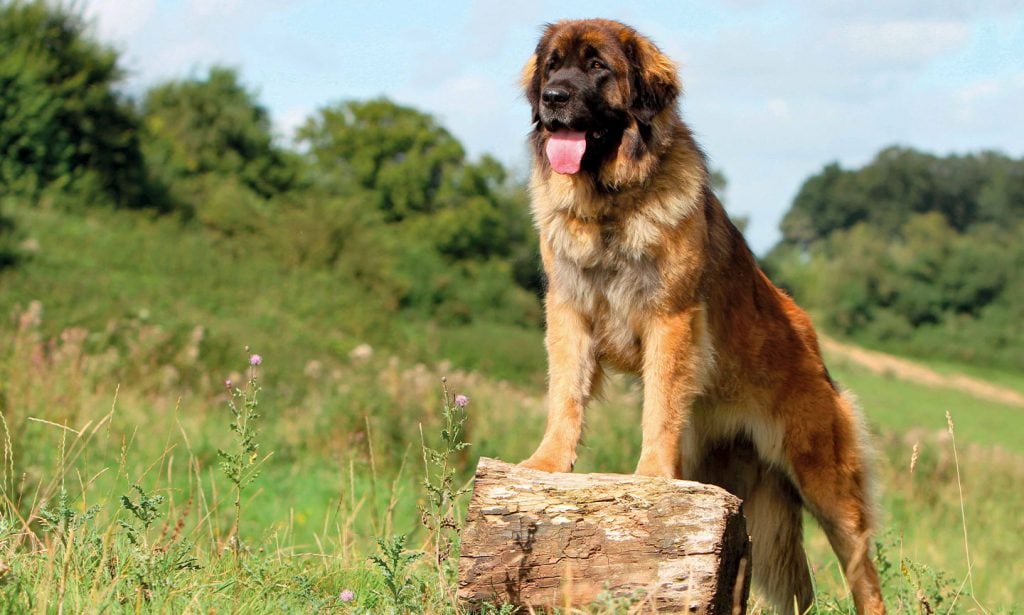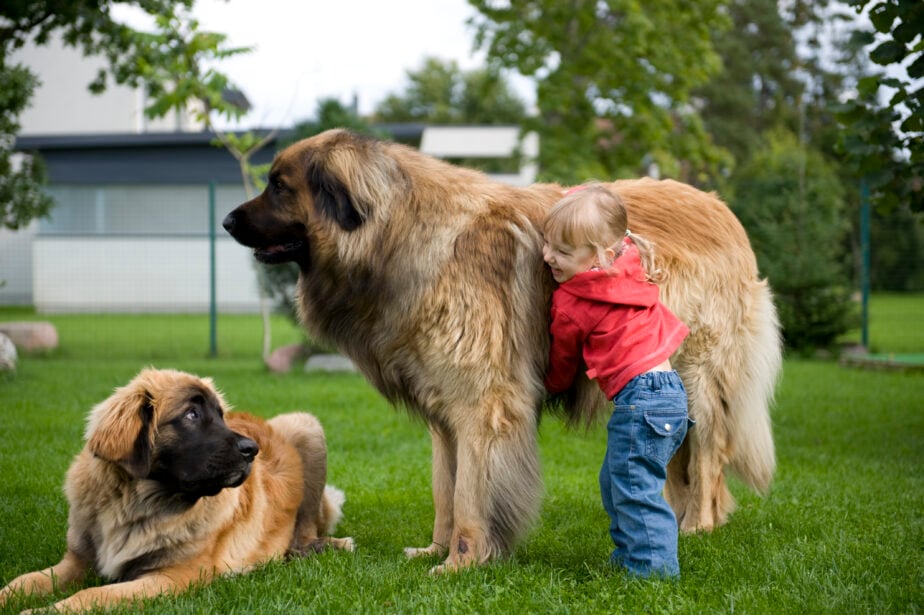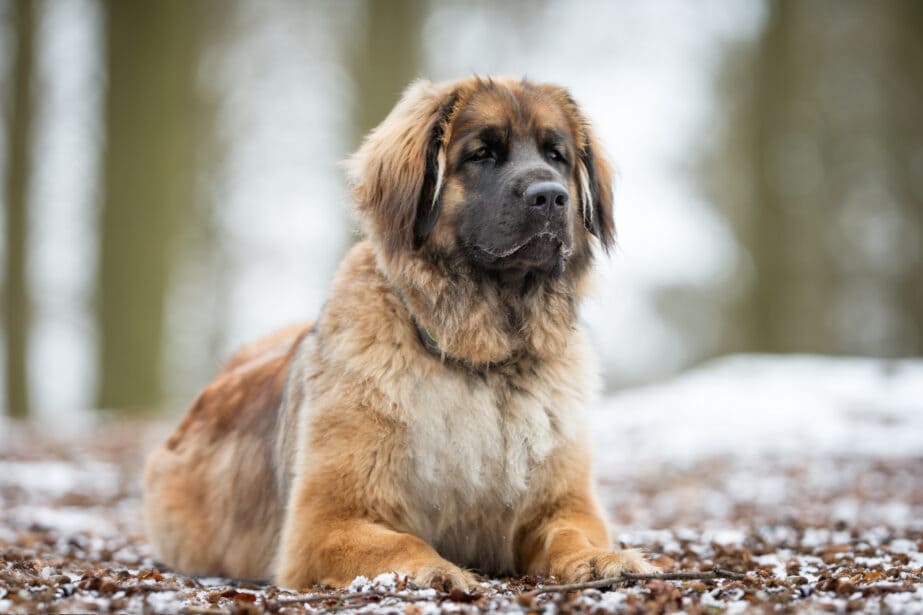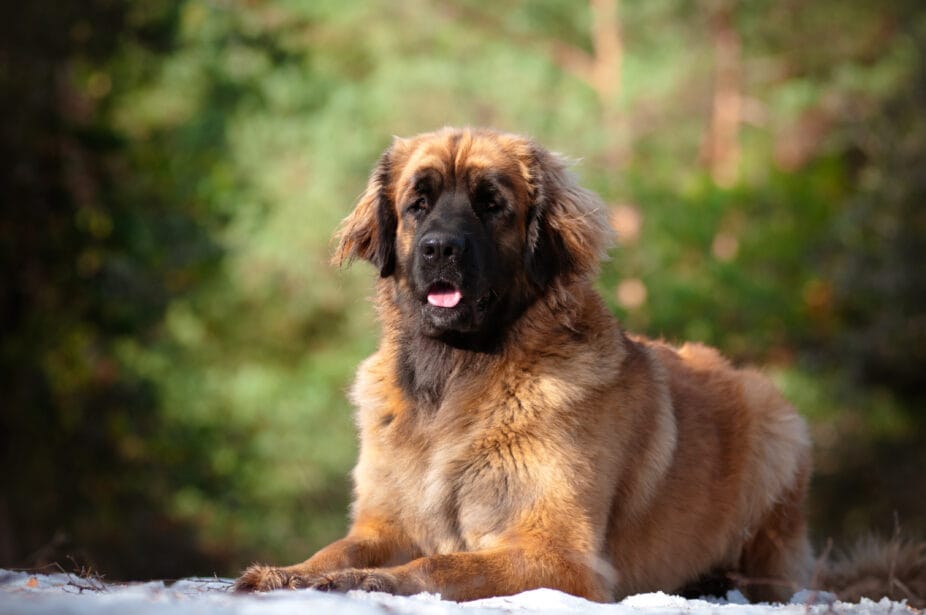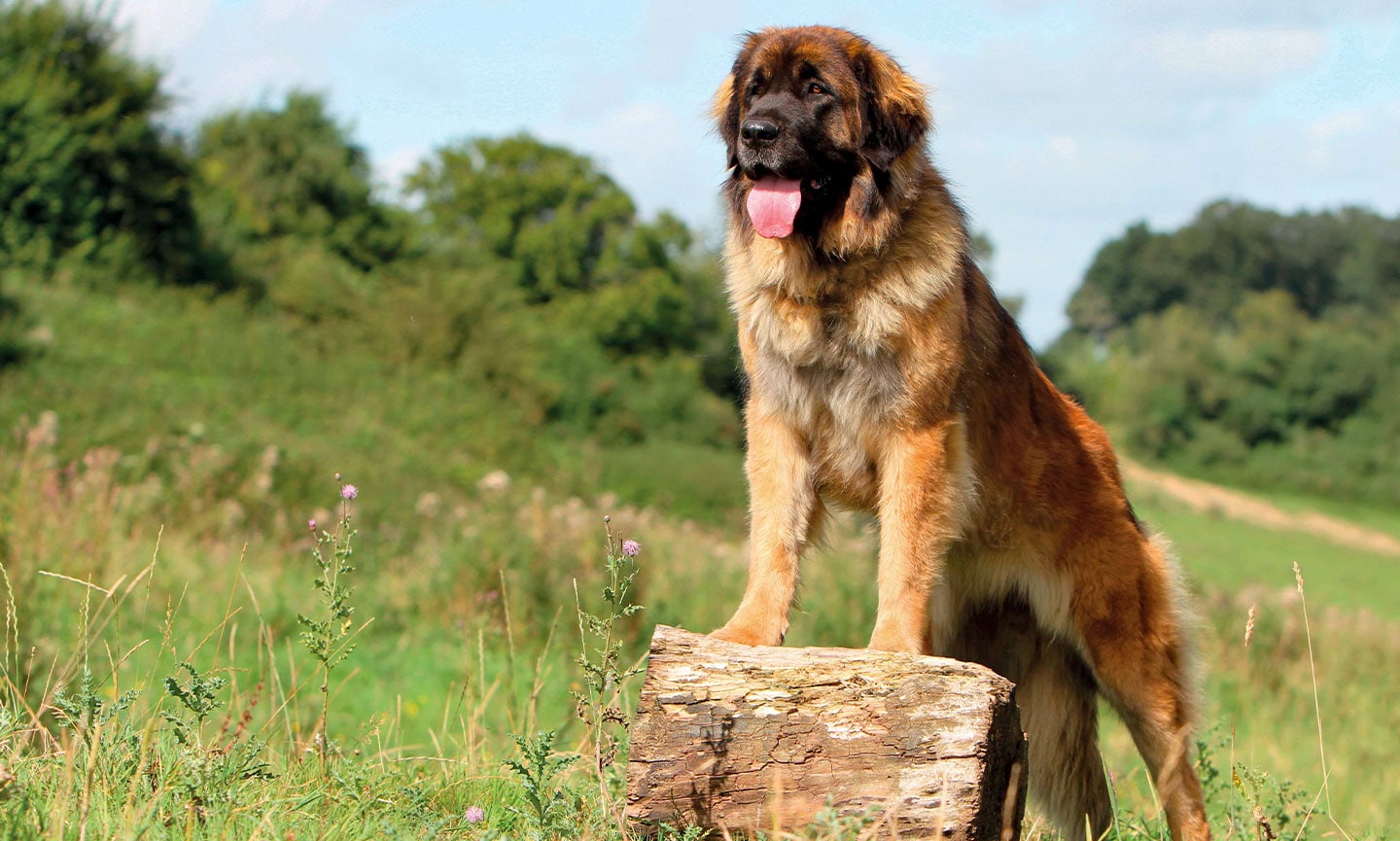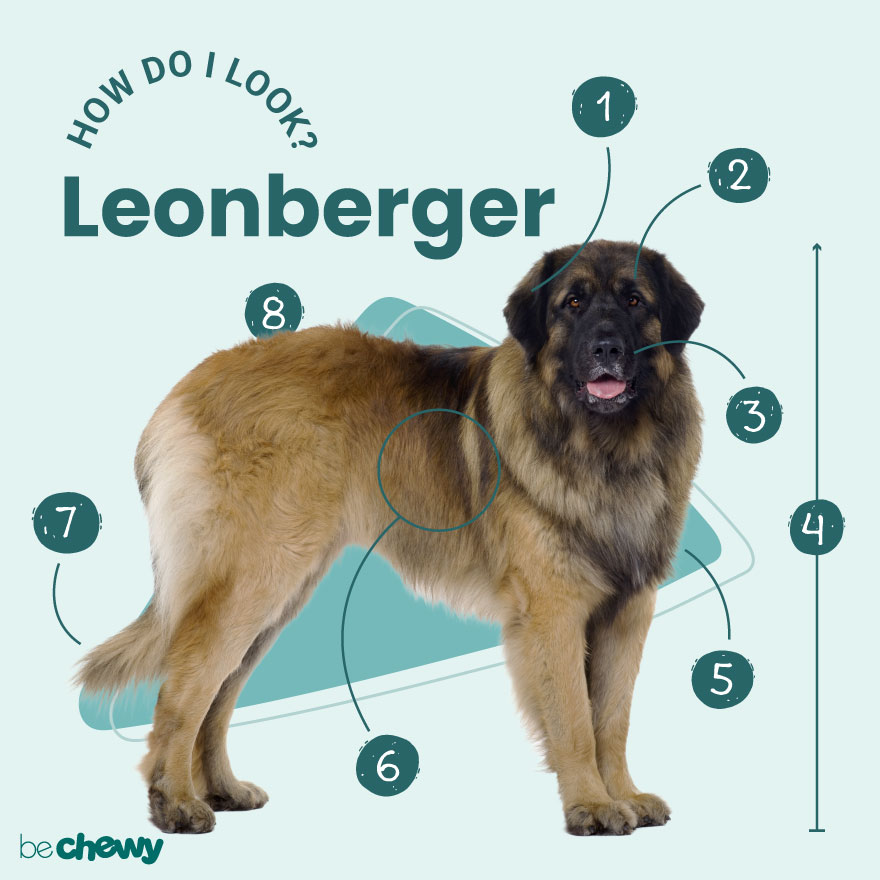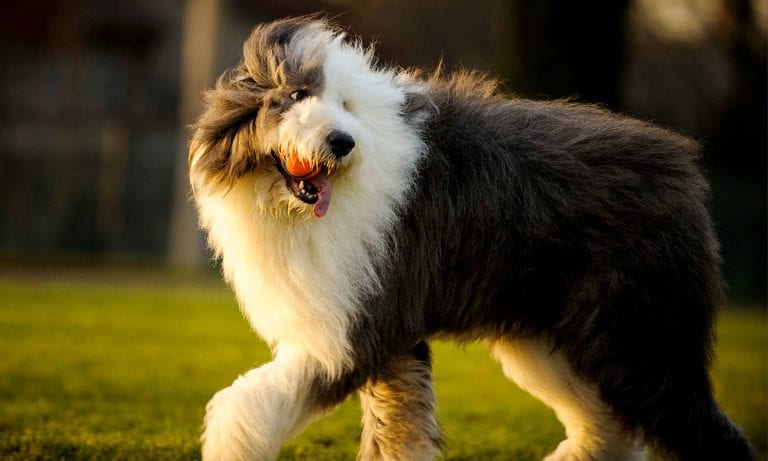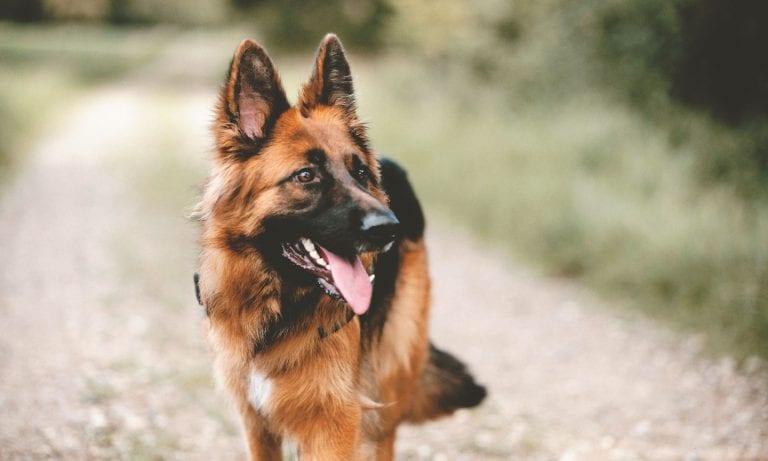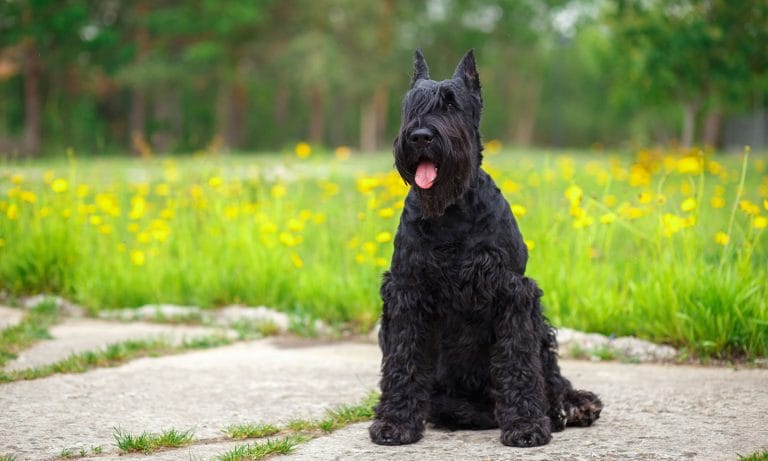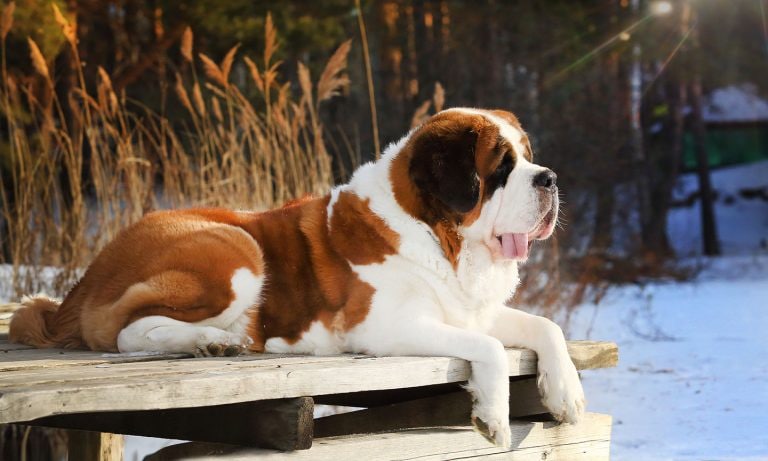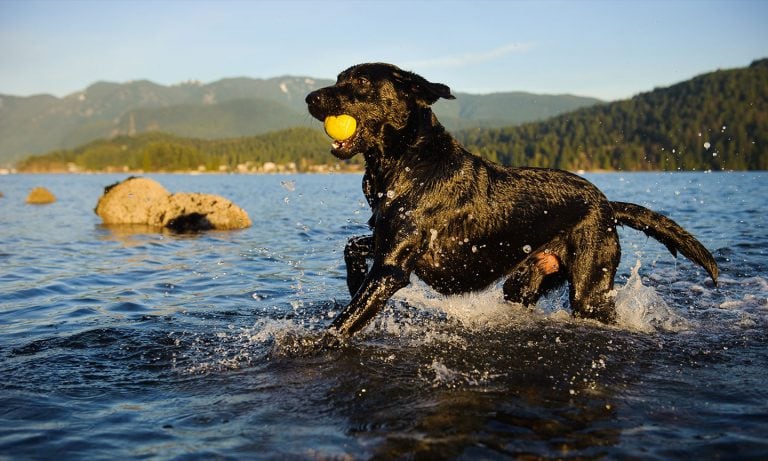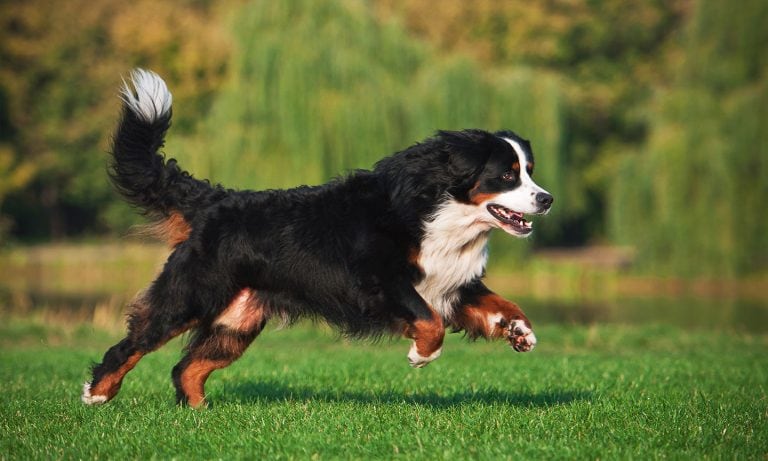Looking for a high-energy bestie who’s eager to play all day with you? Meet the Leonberger. Tell them it’s time for an adventure, and these regal dogs will be wagging their tails in the backseat of your car before you’ve even checked the weather app for rain. Speaking of which, rain-schmain—with that water-resistant coat, a little wet weather won’t dampen their day. While you’re out and about, be sure to snap some pics for your IG feed. That glorious coat and happily wagging tail will make picture-perfect memories to cherish for a lifetime.
Breed Snapshot
Temperament:
AffectionateGentlePlayfulCoat Color:
YellowSandyReddish BrownRed
Best For
Leonberger dogs are gentle giants, known for their adventurous spirit and friendly demeanor. They thrive in homes with pet parents who can provide ample space for them to roam, and who enjoy their loyal and affectionate nature.
Leonberger Temperament
The Leonberger is known as the “gentle lion” for good reason. These pups are playful, tender and affectionate. They are not independent dogs, preferring to be included in all your fun. Leos are very loyal and sensitive to your mood; if you need a hug, they’ll likely want one, too. Their gentleness and sensitive nature make them excellent therapy dogs, as they’re willing to share their love and gentleness with everyone, not just their family.
Leos aren’t known to be aggressive or biters, but they need socialization starting when they’re puppies to bring out their naturally friendly nature. If they’re not socialized as puppies, these dogs may become wary around new people and situations.
Leos love kids and are great playmates, but you’ll need to supervise them around small kids and babies. This giant-sized dog weighs well over 100 pounds, and they have a strong tail. One happy wag in the wrong direction could topple a tiny tot.
How to Care for a Leonberger
The Leonberger breed is a very large dog with very large care needs. With their thick, double coat, it should come as no surprise that they’re heavy shedders, and their fur will need a lot of care to prevent matting, too. These pups have a lot of energy and need a lot of training, as well. So, you’ll be spending a lot of time with your pup every day—and that’s just how you both prefer it.
Leonberger Health
The Leonberger can live a healthy and happy life for such a large dog, with a life expectancy of 7 years. But, like all dog breeds, the Leonberger can be prone to certain diseases. Being aware of these conditions can help you give your pup a long and healthy life.
- Bloat or Gastric Dilatation-Volvulus (GDV): This condition often affects large, deep chested dog breeds like the Leonberger. When it occurs, your dog’s stomach may twist and trap gas inside. Symptoms include a distended stomach, unsuccessful attempts at vomiting and restlessness. Bloat can be a life-threatening condition, so get to your vet immediately if you think your pup has symptoms. As a preventative measure, your vet can perform surgery to stitch the stomach to the side of the body (prophylactic gastropexy). You can also potentially help prevent bloat by avoiding exercising your dog immediately after eating and giving smaller meals throughout the day with a slow feeding bowl.
- Dysplasia: As large dogs, Leonbergers are prone to hip and elbow dysplasia. Dysplasia is a hereditary condition in which the joint is malformed, causing the dog pain. Symptoms of dysplasia include limping, pain and arthritis. Treatments include weight and exercise management, physical therapy or surgery.
- Eye Disease: Leonbergers are prone to a few eye diseases. Cataracts and progressive retinal atrophy (PRA) both lead to blindness. Cataracts can often be corrected with surgery, but PRA does not have a cure or treatment. Entropion, in which the eyelid rolls inward and rubs, can lead to corneal ulcers and is treated with surgery. Ectropion, in which the eyelid rolls outwards, is often treated with medicated eye drops.
- Polyneuropathy: This is a progressive neurological disease that affects the nerves of your dog. Signs can appear from 1 year old. This can cause your dog to tire easily, be unsteady on their paws and have noisy or labored breathing. Unfortunately, there is no treatment to cure the disease, but medication can be given to manage the symptoms.
- Dilated Cardiomyopathy (DCM): This often-inherited heart condition results in an enlarged heart, causing thin and weakened heart muscle. This can lead to heart failure. Treatment is typically daily medication.
Leonberger History
Unlike most other working dogs, which are typically bred for physical labor, the Leonberger was bred to be a companion for European royalty. The breed was founded by Heinrich Essig, a 19th century politician and entrepreneur of Leonberg, Germany. He crossed large working breeds such as Saint Bernards and Newfoundlands, and their offspring served rulers such as Napoleon III, Tsar Alexander II of Russia and the Prince of Wales (later King Edward VII of the United Kingdom).
The Leonberger has also graced households of elites, including composers Richard Wagner and Sergei Rachmaninoff and the Italian patriot Giuseppe Garibaldi. Over time, Leonbergers became working-class dogs who served on farms and other less aristocratic households. The breed was recognized by the American Kennel Club in 2010 and is the club’s 167th breed.
So where’s the best place to find a Leonberger puppy? You can find a list of reputable breeders on the American Kennel Club’s website. The cost of a Leo is between $2,000 and $4,000 which is on the higher end of the scale for the price of a puppy, but oh so worth it! For this price, they’ll typically come screened for potential health and behavioral issues and may even come with papers. But you’ll need to be patient as these puppies are pretty rare. If you’d like to adopt a Leo, reach out to the Leonberger Club of America or search Chewy’s database of adoptable dogs in your area.
FAQs
Do Leonbergers shed?
Yes! Leonbergers shed quite heavily, especially in summer or when the weather gets hot as the undercoat starts thinning. You will have to brush your Leonberger daily throughout the year, with a thorough brushing once a week.
Do Leonbergers drool?
No, Leonbergers don’t drool habitually, but they are known to be sloppy drinkers and can shake off a wet mess when they’re done.
What were Leonbergers bred for?
The Leonberger was originally bred to be a companion to European royalty. They were later used for working on farms and doing other physical labor.
What are the most popular Leonberger names?
The most popular Leonberger names include Max, Juno, Sparky, Princess, Abby, Duke, Persis, Gus, Vulcan, Wolf, Brandy, Molly, Ginger, Lola and Shadow. Get more dog names here.
What are the most common Leonberger mixes?
The most common Leonberger mixes are:
- Leonberger-German Shepherd mix
- Leonberger-Golden Retriever mix
- Leonberger-Poodle mix
- Leonberger-Newfoundland mix
- Leonberger-Husky mix
- Leonberger-Labrador mix
Note: These are not purebred dogs but mixed breeds.
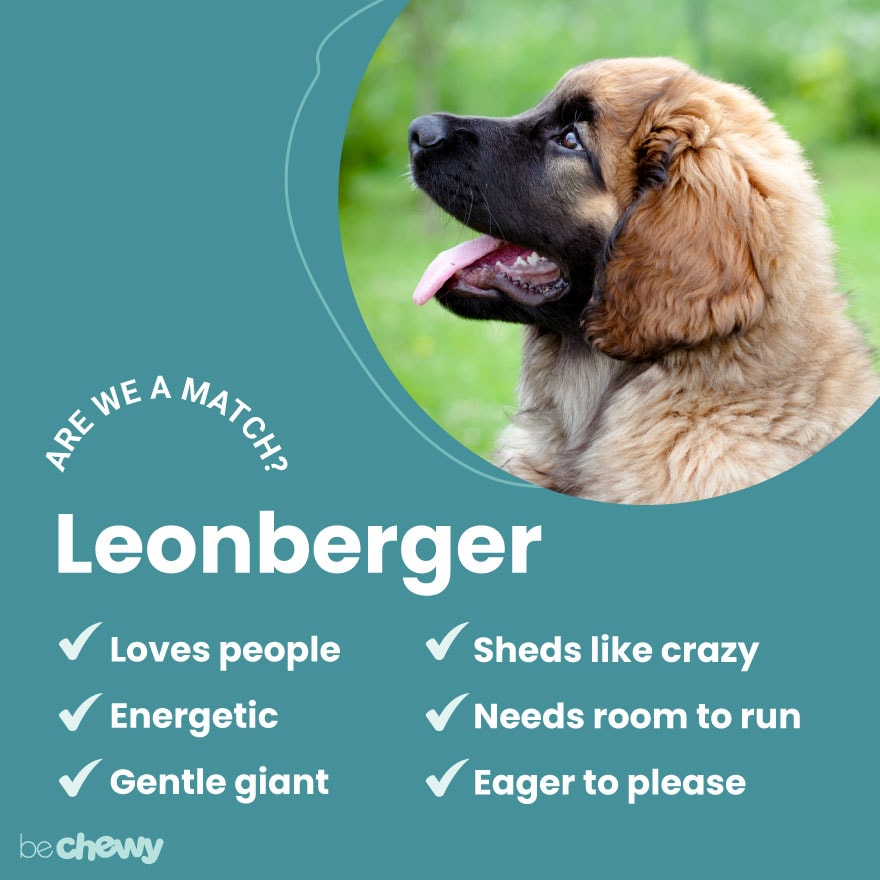
Top Takeaways
One of the dog world’s gentle giants, the Leonberger is playful, affectionate and eager to please. Give them plenty of room to run and you’ll have one happy dog. Life with a Leonberger can be full of fun and affection, but they’re also a lot of maintenance. You’ll be doing a lot of brushing, especially in warm weather, as the Leonberger is a world-champion shedder!
Amber Walker, KPA-CTP, zoologist and owner of Animal Intuitions. Aitrainers.com, and Dr. Sara Ochoa, DVM and veterinary consultant for DogLab.com.
Breed characteristic ratings provided by veterinarian Dr. Sarah J. Wooten, DVM, CVJ, a veterinarian at Sheep Draw Veterinary Hospital in Greeley, Colorado; dog trainer and behavior consultant Irith Bloom, CPDT-KSA, CBCC-KA, CDBC, owner of The Sophisticated Dog, LLC, in Los Angeles; and certified animal behavior consultant Amy Shojai, CABC, in Sherman, Texas.
The health content was medically reviewed by Chewy vets.
Female Names
- Luna
- Joon
- Sadie
- Penelope
- Flora
- Bella
- Bigsby
- Juno
- Koda
- Cleo
Male Names
- Gus
- Charlie
- Axl
- Theo
- Oliver
- Grizzly
- Baloo
- Dante
- Odin
- Otis
Share:
